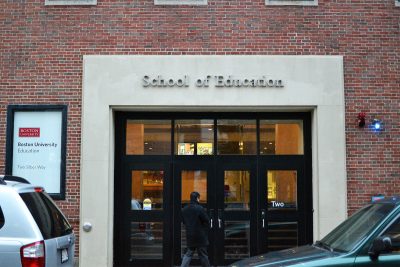
In Massachusetts, most students who were studying to be teachers between 2014 to 2015 are white — 87 percent to be precise, according to most recent data from the Department of Elementary and Secondary Education.
The DOE recognizes this as a problem, and created a task force to combat it in 2013, which recommended the state and individual programs at universities design ways to attract teachers of color to the profession, according to the task force’s 2014 report.
Some schools teach programs more diverse than others. Boston University’s teacher preparation program consists of 529 candidates from minority ethnic groups, which is 24 percent of the program.
BU Upward Bound Project Director Reggie Jean said the efforts to increase diversity have received tremendous support within the School of Education — including adding an equity and inclusion question in the graduate school application and creating a diversity committee for the school.
“SED looks to stay true to BU and its own mission of having a more diverse school,” Jean said. “The university has more impact on the undergraduate end of things. However, there is also some developing work being done within SED, including its College Access and Completion office, to attract more underrepresented undergraduate students to our programs.”
The School of Education’s College Access and Completion office provides direct service to underrepresented students, with the goal of assisting students to be successful in higher education, according to its website.
But the office is working on providing those students with more than just access to school — it wants to give them teachers who they can relate to as well.
Michael Dennehy, director of College Access and Completion, wrote in an email that his office has partnered with groups like Educators Rising and American Association of Colleges for Teacher Education to create programs that recruit and support teachers of color.
“SED is very concerned about this topic and has launched a number of initiatives and partnerships aimed at improving the diversity of teacher prep programs,” Dennehy said.
The problem the AACTE community is addressing is one that many have noticed, including students in BU’s SED program.
“It’s mostly white females taking the field because that’s how it always been,” said junior Tori Coughlin. “Females used to not be able to do anything except teaching or nursing, so I think it’s something they’ve continued to do. Females are the [caregivers] and it kind of goes well, but I think there are other students coming through that need more than just white females.”
Coughlin is also a member of Educators Rising at BU — the first collegiate chapter of the national organization that works within communities to recruit high school students of color to consider teaching.
“I definitely think it’s important to recruit minorities,” Coughlin said. “Students can make their learning more meaningful when they can relate it to their own background. Other teachers can try and work on that … but it’s way easier if you have a teacher who already has the same culture as you or same background.”
Mairead Mazan, another junior in SED, said having mostly white, female teachers is something of “a cultural norm,” but she believes BU is working to fight this.
“We talk a lot about how kids need mirrors and windows where they need to see themselves in certain situations, and they also need to see people like them reaching goals that they can one day hopefully attain themselves,” Mazan. “So if you have diverse students who have diverse teachers, it allows them to see people like them in positions teaching and things like that.”
BU is doing other work in the community to get minority K-12 students and future teachers working together.
First-year SED graduate student Shana Jones works at Boston University Initiative for Literacy Development to provide tutoring to minority students in Boston. Jones said recruiting minorities as teachers can reach out to a wider population.
“I would say that [BU provides opportunities to minorities] because number one, I’m a minority, and I work with a lot of other minorities who go out into the community and teach to other minorities,” Jones said.
Professors within the program, such as Michelle Porche, said they notice and appreciate the effort, and they are hopeful about the future of the school.
“I very much appreciate the priority that Dean Hardin Coleman has made for increasing faculty diversity as well as student diversity,” Porche wrote in an email. “BU has a lot of work to do, but the School of Education is moving in a positive direction.”
Shannon Larson contributed to the reporting of this story.























































































































